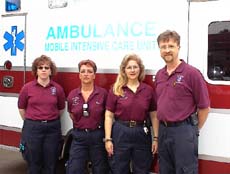|
In
fact, Logan County was the first to have advanced life support
capabilities in rural downstate Illinois, said Siltman. The
association is licensed by the Illinois Department of Public
Health and has 13 full-time paramedics, including the general
manager, and 11 part-time medics.

[Paramedics to the rescue: (left to
right)
Jill Peterson, Tina Pitchford, Polly Riggs
and Steve Siltman, general manager]
The
paramedics work 24-hour shifts beginning at 7 a.m. There are three
shifts, each with its own manager: John Olmstead, A-shift; Penny
Thomas, B-shift; and Tina Pitchford, C- shift. Each shift is
staffed with four medics. The state requires that one medic staff
each ambulance; LCPA uses two. Siltman said, "We feel that
two paramedics offer a checking system when making and acting on
decisions."
All
911 calls go directly to the communications room of the Logan
County Safety Complex in Lincoln. Radio operators receive the
calls, and the computer automatically identifies the location of
the telephone and its rescue district. The operator dispatches the
rescue squad and the ambulance service for the callerís
district. The rescue squads, usually attached to a fire
department, are generally the first responders. Rescue squad
members are Emergency Medical Technicians (EMTs) equipped with
basic medical training. The rescuers inform the dispatcher of the
basic problem, and that information is relayed to the ambulance en
route.

Upon
the arrival of the ambulance, the paramedics take over. The rescue
squad stays with the ambulance until the patient is loaded, and if
an extra pair of hands is needed, a rescue squad member may ride
in the ambulance to the hospital. Once the patient is on board,
the paramedics call the hospital with the patientís vital signs,
medical history and to get further instructions. Hospital
emergency personnel meet the ambulance at the hospital doors. Once
the patient is in the emergency room, a paramedic gives an updated
report of the patientís condition and completes a run sheet that
outlines everything that was done to the patient. The ambulance is
then cleaned up and prepared for the next run.
Siltman
said that on average, calls in the city take one hour from the
receipt of the call to the final paperwork. County calls may take
one to three hours, especially if it is a case where the patient
is taken to a trauma center. If both crews are dispatched and a
third emergency call is received, LCPA has a contract with an
ambulance service in Mason City. They would come to Lincoln and be
on standby. Mason City has two ambulance providers.
(To top of second
column)
|

LCPA
receives approximately 3000 calls per year or nine calls per day. The
majority of their calls are emergency 911 calls, approximately 140
calls per month. Forty calls per month are for hospital-to-hospital
transfers, and there are 50 to 60 routine, non-emergency calls
requesting transports from the hospital to nursing homes for patients
who cannot be taken by car.

According
to Siltman, Abraham Lincoln Memorial Hospital (ALMH) had run the
ambulance service since the 1970s. When ALMH decided not to renew
their contract, the county board put out a bid for a new ambulance
provider. The Logan County Paramedic Association won the bid. They put
sheets on the guerneys and opened Dec. 1, 1999. The LCPA is a
privately owned, incorporated, not-for-profit organization governed by
a 10-member board comprised of members throughout the county.
LCPA
rents space from ALMH and is located behind the hospital. There is a
five-bay garage for the ambulances and a house that serves as office
space and living quarters for those on duty.

[Five- bay garage for the
ambulance service vehicles]
"There
is not much of a profit margin in an ambulance service," Siltman
said. "There is a county tax levy that helps us to obtain
equipment. Our pay and benefits are a little higher, our working
conditions are better, and our ambulances and equipment are maintained
better than many ambulance services."
Employment
trends show that there is a shortage of paramedics. Siltman said,
"You wonít get rich, but you can make a decent living. Most of
the people who do it, love it, and this is what they want to do."
[Kym
C. Ammons-Scott]
|



